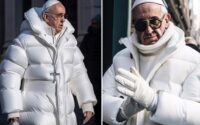Google faces Supreme Court in lawsuit over Section 230
Google is being hauled before the Supreme Court this week as part of a lawsuit that could radically alter the future of online speech and content moderation.
The tech giant will defend the statute known as Section 230 of the Communications Decency Act, which immunizes internet companies from lawsuits over content posted by third parties.
Open arguments before the nine justices are scheduled to begin on Tuesday.
The case against Google was brought by the family of a woman who was killed in a 2015 ISIS terror attack in Paris.
Nohemi Gonzalez, a 23-year-old American college student, died in a hail of bullets fired by Islamist militants as she sat at a bistro called La Belle Epoque, part of a rampage of shootings and suicide bombings that killed 130 people in the French capital.
Her parents, mom Beatriz Gonzalez and stepdad Jose Hernandez, allege that Google-owned YouTube is liable for damages because it failed to remove ISIS terrorist videos.

Gonzalez and Hernandez allege that YouTube’s algorithm even boosted the videos by recommending them to some users.
They are asking the Supreme Court to rewrite Section 230 — dubbed “the Magna Carta of the internet” — so that tech companies that allow malicious content to proliferate online can be held liable.
The Post has sought comment from Google’s parent company, Alphabet.
Google prevailed in lower courts by arguing that it is protected by Section 230 of the 1996 Communications Decency Act. The law is often seen as a shield because it prevents platforms from being sued for hosting harmful user posts, a measure that has been credited with paving the way for tech titans to reap financial windfalls.
There is bipartisan support in Congress for rewriting Section 230, which prohibits “interactive computer services” from being treated as the “publisher or speaker” of information provided by outside users.
Liberals allege that tech firms have used the statute to allow the unfettered spread of disinformation, while conservatives say that internet companies have abused the law to curtail right-leaning speech.
According to court papers, YouTube’s automated algorithms that generate recommended videos for users in effect “provided material assistance to, and had aided and abetted, ISIS” — which is a violation of the Anti-Terrorism Act.

The Anti-Terrorism Act allows Americans to sue in court in hopes of recovering damages related to an “act of international terrorism.”
Google has been accused of “knowingly permitt[ing] ISIS to post on YouTube hundreds of radicalizing videos inciting violence and recruiting potential supporters to join the ISIS forces [in the Middle East] … and to conduct terrorist attacks in their home countries,” according to court documents.
Furthermore, Google “recommended ISIS videos to users … based on what Google knew about each of the millions of YouTube viewers, targeting users whose characteristics indicated that they would be interested in ISIS videos,” court documents allege.
“It’s very important for the law to change,” Beatriz told Reuters, adding that a ruling in her favor would benefit not just her family but “all people who have been suffering these attacks, everywhere.”

But attorneys for Google claimed in court documents that Gonzalez’s parents failed to provide evidence that any of the ISIS attackers who committed the attacks in Paris nearly eight years ago were inspired by YouTube videos.
“This court should not undercut a central building block of the modern internet,” Google told the justices in a filing.
“Eroding Section 230’s protection would create perverse incentives that could both increase removals of legal but controversial speech on some websites and lead other websites to close their eyes to harmful or even illegal content,” it added.
“Congress was clear that Section 230 protects the ability of online services to organize content,” Google’s top lawyer, Halimah DeLaine Prado, told The Post.
“Eroding these protections would fundamentally change how the internet works, making it less open, less safe, and less helpful.”
“We are proud to make our case to the Supreme Court,” DeLaine Prado said.
Legal scholars fret about a fading of free speech online — with certain content stifled — should Section 230 be weakened.
“That user content might include information that both sides of the political aisle might find important — for example, claims about sexual harassment or police abuse or government policies on vaccines,” said Anupam Chander, a technology regulation expert at Georgetown University Law Center.
“This case truly could reshape the internet for the next generation,” Chander added.
The Supreme Court decided last fall to hear the case. Many legal scholars believe that Justice Clarence Thomas likely led the push to review the case. The conservative justice had previously suggested in court statements and opinions that the federal courts’ current interpretation of Section 230 could be too broad, the Wall Street Journal reported.
A decision is expected in late June or early July.
With Post wires


